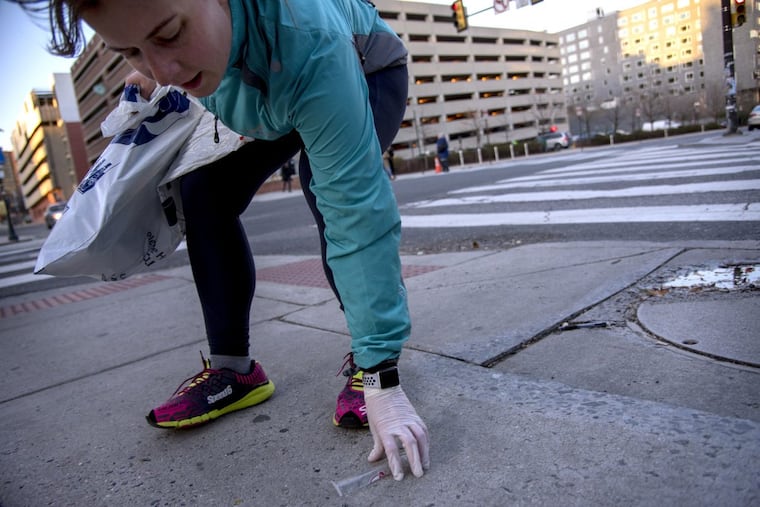The latest Scandinavian clean-living craze to hit Philly: 'plogging'
Plogging, the act of picking up litter while jogging, is a questionably efficient but runner-embraced fad.

The concept is pretty simple — you go for a run, you see trash, you pick it up.
The execution? That's a little messier.
Plogging, the act of picking up litter while jogging, is becoming something of a fad, originating in Sweden, where "to pick up" is to plocka upp.
The idea behind plogging (which a lot of people just called "trash runs" before the super-svelte Swedes gave it a name) is that with so many runners traversing neighborhoods, even a few items collected on a daily jaunt, multiplied by hundreds of thousands of people, put a dent in the seemingly intractable issues cities face with litter.
"I thought it sounded kind of weird, to be honest," said West Philly runner Alon Abramson, 34, who volunteered his running club for a trial plog Wednesday night. "It didn't seem very … efficient? But doing it as a part of a running group, opposed to alone, you'll have a small army and you can really make more of an impact."
Philadelphia's inaugural "plogging" week is April 9-15, a collaboration among the Clean Air Council, the antilitter community group Not in Philly, and running groups that have committed to adding trash pickup to their weekly runs. Seventeen events are already on the schedule and open to the public.
On Wednesday about 20 runners, wearing white rubber gloves and hauling trash bags, gathered in West Philly. The pace was dictated by what needed picking up.
"To make this not self-defeating and turn it into a walk, pick up one to two pieces per block," Abramson told his assembled club. "Don't get too compulsive." He advised his runners to stick to residential blocks and skirt Penn's campus: "That's immaculate. They don't need our help."
This reporter went along for the run. As soon as we got going, we stopped abruptly at an empty Cheetos bag. We got going again and then stopped for a slab of water-soaked cardboard. Onward. Pause. Repeat.
"It's sort of like an urban Easter egg hunt," said Kayt Ahnberg, a librarian at Penn, as she bagged a clutch of windblown plastic bags.
None of the runners seemed under the pretense that they were solving the city's litter problems — or getting a great workout — but the run did seem cleansing. It doubled as a kind of civics meeting-on-the-move for conversations about the city's nagging trash problems.
Ahnberg moved to Philadelphia from Florida six months ago. She said she's fallen in love with her new home but can't get over the litter. "There's a lot. My friend called it 'Filthadelphia' when I moved here. He's from Pittsburgh and he almost wouldn't visit," she said.
As for plogging? "I think it's awesome. It's people kind of taking back the streets a little bit," she said. "The idea you can meet your neighbors, go outside and spend time making your neighborhood a little better and then all sit down and have a drink, what's wrong with that?"
Philadelphians pass litter every day, joggers maybe more than most. A run can illustrate inequities in how litter is dealt with across neighborhoods.
"It's not going to be a magic bullet to remove all the litter in this city, but I do think it is useful, not only to raise the awareness of the litter problem but to show that the citizens are kind of out in front and doing what they can and getting some good exercise as well," said Dave Brindley, who started Not in Philly, a nonprofit where residents adopt blocks to police.
"We are not expecting runners, if they see a discarded dishwasher, to pick it up."
Though that would be more of a workout. And there's plenty of advice out there on how to make plogging strenuous. Rather than bend over, why not deep squat down to the trash or do a burpee toward the fast-food wrapper?
Kyle Cassidy, a photographer from West Philly, had a different take on the idea: Organize a group run to a designated lot or block that needs cleaning, get it all picked up at once, and then run to another spot. Maybe a block captain or volunteer could collect the bags at each given location.
"I think we have to make sure we're thinking about what happens at the other end of this," said the first-time plogger. "because obviously we're not going to plog every week, we're not going to plog the city clean."